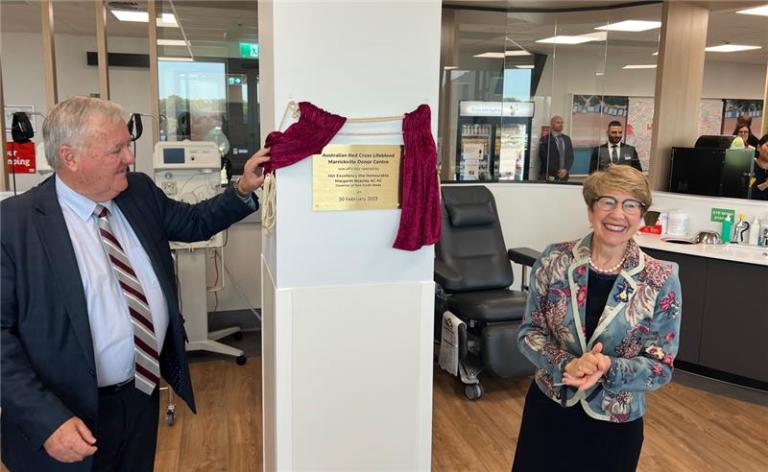Saving and improving lives with a world-class blood supply

Saving and improving lives with a world-class blood supply is the mission of the National Blood Authority (NBA). The NBA manages the national arrangements agreed and funded by the Australian and state and territory governments for this important work. For more than 20 years, the national blood arrangements have successfully delivered an uninterrupted supply of blood and related products and services to Australians who need them.
To achieve this, the NBA plays a critical leadership role with the Australian Government and state and territory governments, the Australian Red Cross Lifeblood, domestic and multi-national commercial suppliers, expert clinical committees, patient and other groups, and advisors.

NBA Chief Executive John Cahill with the New South Wales Governor, Her Excellency the Hon Margaret Beazley, at the official opening of the new Lifeblood Donor Centre at Marrickville, NSW, January 2023
Image: National Blood Authority
The NBA faced challenges in supply and demand management in 2022–23. The pressure on blood inventory is a global issue, not just an Australian one. Through effective management of collection and supply contracts, the NBA navigated challenges in the supply chain resulting from:
- increased demand for red blood cells
- fluctuating levels of blood donations
- unusual patterns of demand during and since the COVID-19 pandemic.
The levels of plasma collection were significantly below targets during 2022–23, resulting in decreased production of domestic immunoglobulin. By analysing data, and drawing on established relationships with stakeholders and suppliers, the NBA could intensively monitor supply, demand and inventory trends to effectively respond to changing patterns.
Using its arrangements with suppliers, the NBA carefully managed product allocation to new patients and, where appropriate and necessary, switched existing patients to equivalent products for uninterrupted clinical treatment.
The NBA has supported Lifeblood to implement measures to increase whole blood and plasma donations. Measures included:
- opening new donor centres
- conducting major advertising and marketing campaigns
- implementing donor retention initiatives such as the Lifeblood Gifts trial
- removing the indefinite deferral for donors who lived in the United Kingdom in the 1980s and 1990s.
As a patient-led charity of which the majority of our cohort are reliant on regular immunoglobulin infusions as replacement therapy to stay alive and as well as possible, we are very grateful to have the National Blood Authority ensuring ongoing and safe supply especially in today’s environment of limited global supply. – Jackie Murphy, President AusPIPS, Advocacy and Support for people with Primary Immune Deficiency
We have a positive working relationship with the NBA and have found that they are always willing to provide us with information, meet in-person and be available to present at member events and conferences to ensure that our community is well-informed. – Carolyn Dews, Chief Executive Officer, Immune Deficiencies Foundation Australia
The NBA makes a significant impact on the lives of Australians living with a bleeding disorder, and by ensuring an ongoing supply of best-practice treatment products contributes to them living full and productive lives. – Sharon Caris, Executive Director, Haemophilia Foundation Australia
The NBA has collaborated with the Australian Commission on Safety and Quality in Health Care on the National Safety and Quality Health Service standards to develop the Blood Management Standard. This standard improves outcomes for patients by identifying risks and using strategies that optimise and conserve a patient’s own blood and ensuring that the blood and blood products patients receive are safe and appropriate.
As well as securing blood supply in the short and medium term, the NBA invests in longer-term knowledge and innovation development. This investment has the potential to advance the blood sector through better collection, management and supply, and ultimately better outcomes for patients. Since 2015, the NBA has funded 40 research projects through 5 funding rounds, to a value of around $6 million.



